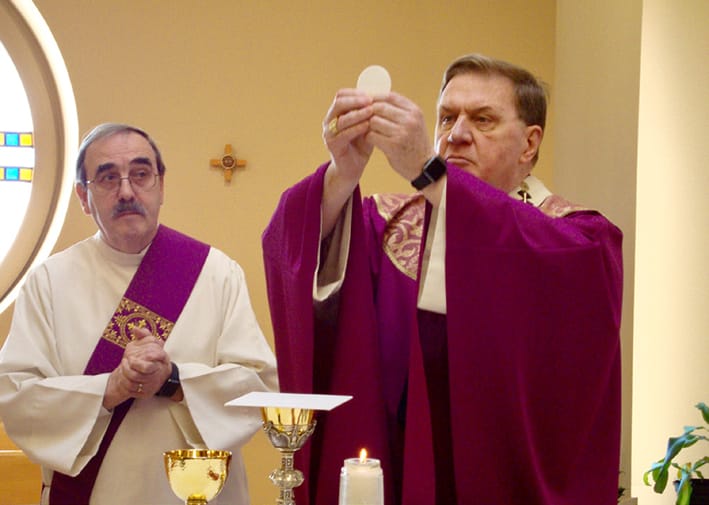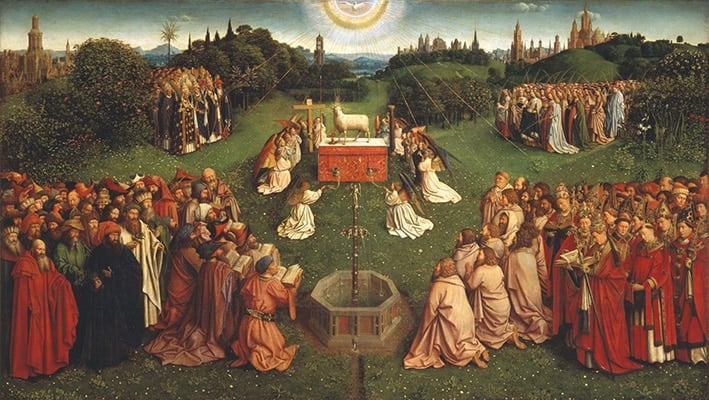
“Dear Father, When the priest holds up the host before Communion and says, “Blessed are those called to the supper of the Lamb”, is he referring to the supper of Communion in the Mass or to the wedding feast of the Lamb in heaven? Or possibly both?
While, as far as I am aware, there is no official Church teaching on this point, it has always seemed clear to me that those words refer both to the Communion of the Mass and to the wedding banquet of the Lamb in heaven.
The most obvious and immediate reference is to Communion in the Mass, which the faithful in the Mass will receive a few minutes later. But why the reference to the Lamb, when what is received in Communion is the Body of Christ in the host and the Precious Blood in the chalice?
The answer takes us back to what the priest has just said when holding up the host:
“Behold the Lamb of God, who takes away the sins of the world. Blessed are those called to the Supper of the Lamb.”
The Lamb of God who takes away the sins of the world is Christ himself, present in the host. Those are the words St John the Baptist used when he pointed Jesus out to his disciples: “Behold, the Lamb of God, who takes away the sin of the world” (Jn 1:29).
It is Christ himself, the Lamb, whom the people will receive in Holy Communion. The reference to the Lamb also takes us back to the Pass-over, which was a figure of the Eucharist.
As we recall, on the night before Moses led the Israelites out of Egypt he told them to slaughter a lamb and eat it roasted over a fire.
They were to sprinkle the blood of the lamb on the door posts and lintel of the house so that when the angel of death came that night and killed the first-born of the Egyptians, he would pass over the first-born of the Israelites (cf. Ex 12:1-13).
This is an obvious symbol of the blood which Christ, the Lamb of God, would shed on the Cross of Calvary on Good Friday to redeem us and save us from eternal death.
Christ referred to this in the Last Supper when he blessed the chalice and gave it to the apostles, saying “This is my blood of the covenant, which is poured out for many for the forgiveness of sins” (Mt 26:28).
And just as the Israelites ate a lamb they had previously sacrificed, so in the Mass we receive in Communion the Body and Blood of Christ, which have previously been offered in the sacrifice of the Mass. Thus, the Mass is not just a fraternal meal, a banquet, but a communion sacrifice, in which the victim is first sacrificed and then received in Holy Communion.
This is mentioned in the Prayer after Communion in the Mass for the thirteenth Sunday in Ordinary Time: “May this divine sacrifice we have offered and received fill us with life.”
As regards whether the “Supper of the Lamb” refers also to the wedding banquet of heaven, we find practically the same words we use in the Mass in the Book of Revelation: “Blessed are those who are invited to the marriage supper of the Lamb” (Rev 19:9).

Throughout the Book of Revelation we see the heavenly worship offered to the Lamb, who is Jesus Christ.
The two meanings are related in that our Communions on earth prepare us for entry into heaven, where we too will share in the heavenly banquet.
Just as the Israelites ate the manna which fell from heaven for forty years before they entered the Promised Land, so Eucharistic Communion is our “daily bread” which nourishes us on our journey through life to the Promised Land of heaven.
At the same time the reception of Holy Communion is accompanied by a promise of heaven. In the synagogue of Capernaum Our Lord said: He who eats my flesh and drinks my blood has eternal life, and I will raise him up at the last day” (Jn 6:54).
And the Eucharist is an anticipation of heaven: “He who eats my flesh and drinks my blood abides in me, and I in him” (Jn 6:56).
To abide in Jesus is what we will experience in heaven. We will be in communion with the Son, the Father and the Holy Spirit, as we see God face to face.
In fact, the Catechism describes heaven in those very terms: “This communion of life and love with the Trinity, with the Virgin Mary, the angels and all the blessed is called ‘heaven’” (CCC 1024).
Related
Fr John Flader: life with the coronavirus
Q&A with Fr John Flader: Attending assisted suicide
